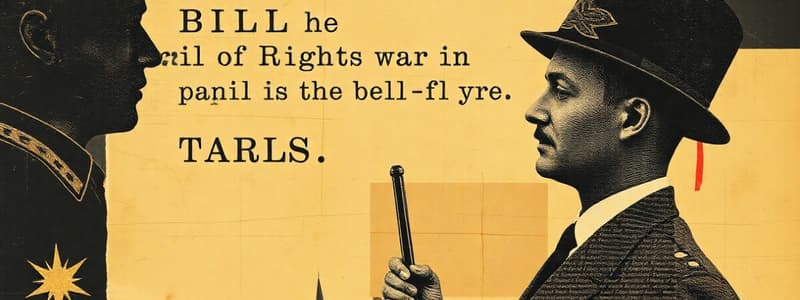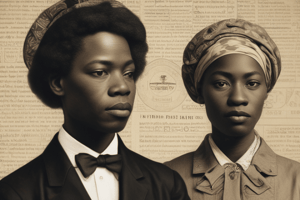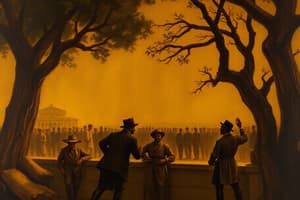Podcast
Questions and Answers
In Barron v. Baltimore (1833), what was the Supreme Court's ruling regarding the Bill of Rights?
In Barron v. Baltimore (1833), what was the Supreme Court's ruling regarding the Bill of Rights?
- The Bill of Rights applied to both federal and state governments.
- The Bill of Rights applied only to actions by the federal government, not state or local governments. (correct)
- The Bill of Rights did not apply to property rights under the Fifth Amendment.
- The Bill of Rights applied only to state governments, limiting federal power.
What was the primary motivation behind the Radical Republicans' push for constitutional amendments following the Civil War?
What was the primary motivation behind the Radical Republicans' push for constitutional amendments following the Civil War?
- To ensure the rights and protections of formerly enslaved people against discriminatory state laws. (correct)
- To promote economic development in the South.
- To expand the rights of women and Native Americans.
- To limit the power of the federal government over the states.
Which amendment directly addresses civil liberties and rights in general, extending these protections to the states?
Which amendment directly addresses civil liberties and rights in general, extending these protections to the states?
- The Fifteenth Amendment
- The Thirteenth Amendment
- The Fourteenth Amendment (correct)
- The Tenth Amendment
What specific action by state governments spurred the Radical Republicans in Congress to advocate for constitutional amendments?
What specific action by state governments spurred the Radical Republicans in Congress to advocate for constitutional amendments?
How does the Fourteenth Amendment's privileges and immunities clause relate to Article IV, Section 2 of the original Constitution?
How does the Fourteenth Amendment's privileges and immunities clause relate to Article IV, Section 2 of the original Constitution?
What was the immediate response of the Radical Republicans in Congress to the passage of 'Black Codes' in the Southern states?
What was the immediate response of the Radical Republicans in Congress to the passage of 'Black Codes' in the Southern states?
Which group's voting rights were not protected by the Fifteenth Amendment?
Which group's voting rights were not protected by the Fifteenth Amendment?
If a state law punishes out-of-state drivers more severely than in-state drivers for the same speeding offense, which constitutional principle is being violated?
If a state law punishes out-of-state drivers more severely than in-state drivers for the same speeding offense, which constitutional principle is being violated?
What is the central debate among legal scholars regarding the privileges or immunities clause of the Fourteenth Amendment?
What is the central debate among legal scholars regarding the privileges or immunities clause of the Fourteenth Amendment?
In Saenz v. Roe (1999), what specific right did the Supreme Court argue is protected by the privileges or immunities clause?
In Saenz v. Roe (1999), what specific right did the Supreme Court argue is protected by the privileges or immunities clause?
How does the due process clause of the Fourteenth Amendment extend beyond mere procedural justice?
How does the due process clause of the Fourteenth Amendment extend beyond mere procedural justice?
What was the significance of Sherbert v. Verner (1963) in the context of the Fourteenth Amendment's due process clause?
What was the significance of Sherbert v. Verner (1963) in the context of the Fourteenth Amendment's due process clause?
What is meant by the term 'selective incorporation' in the context of the Bill of Rights and the Fourteenth Amendment?
What is meant by the term 'selective incorporation' in the context of the Bill of Rights and the Fourteenth Amendment?
How does selective incorporation affect the relationship between state laws and the Bill of Rights?
How does selective incorporation affect the relationship between state laws and the Bill of Rights?
Under the Fifth Amendment, what role does a grand jury play in the federal court system regarding felony cases?
Under the Fifth Amendment, what role does a grand jury play in the federal court system regarding felony cases?
In what way does the Fourteenth Amendment extend the protections of the Constitution against actions by state governments?
In what way does the Fourteenth Amendment extend the protections of the Constitution against actions by state governments?
Flashcards
Barron v. Baltimore
Barron v. Baltimore
Supreme Court case (1833) stating the Bill of Rights only applied to the federal government, not state governments.
Chief Justice John Marshall
Chief Justice John Marshall
He wrote the Supreme Court's ruling in Barron v. Baltimore.
"Black Codes"
"Black Codes"
Laws passed by Southern states after the Civil War restricting the rights of formerly enslaved people.
Radical Republicans
Radical Republicans
Signup and view all the flashcards
Thirteenth Amendment
Thirteenth Amendment
Signup and view all the flashcards
Fourteenth Amendment
Fourteenth Amendment
Signup and view all the flashcards
Fifteenth Amendment
Fifteenth Amendment
Signup and view all the flashcards
Privileges and Immunities Clause
Privileges and Immunities Clause
Signup and view all the flashcards
Privileges or Immunities Clause
Privileges or Immunities Clause
Signup and view all the flashcards
Saenz v. Roe (1999)
Saenz v. Roe (1999)
Signup and view all the flashcards
McDonald v. Chicago (2010)
McDonald v. Chicago (2010)
Signup and view all the flashcards
Due Process Clause
Due Process Clause
Signup and view all the flashcards
Sherbert v. Verner (1963)
Sherbert v. Verner (1963)
Signup and view all the flashcards
Selective Incorporation
Selective Incorporation
Signup and view all the flashcards
Grand Jury
Grand Jury
Signup and view all the flashcards
Felony
Felony
Signup and view all the flashcards
Study Notes
- In the decades after the Constitution's ratification, the Supreme Court initially declined to apply the Bill of Rights to limit state power.
- The 1833 case Barron v. Baltimore established that the Bill of Rights only applied to the federal government, not state or local governments
- Chief Justice John Marshall stated the Constitution wasn't intended to protect people from their own state governments.
- The issue of enslaved persons' rights and the Civil War led to a reevaluation of applying the Bill of Rights to the states.
- After the Thirteenth Amendment abolished slavery, Southern states passed "Black codes" restricting former slaves' rights.
- Black codes limited the right to hold office, own land, or vote, relegating formerly enslaved people to second-class citizenship
- Radical Republicans in Congress sought to overturn the Black codes.
- They advocated suspending civilian government in Southern states and replacing discriminatory politicians and pushed for constitutional amendments to guarantee rights for freed people.
- The Fourteenth Amendment addressed civil liberties and rights, and the Fifteenth Amendment protected voting rights, excluding women and Native Americans.
- The Fourteenth Amendment, ratified in 1868, clarified the scope and limits of civil liberties.
- The amendment states that no state can create or enforce laws that infringe upon the privileges or immunities of citizens of the United States.
- This echoes the privileges and immunities clause in Article IV, Section 2, of the original Constitution, ensuring equal treatment of citizens across states.
- The meaning of the privileges or immunities clause has been debated, regarding whether it extends the entire Bill of Rights or only some rights to the states.
- In Saenz v. Roe (1999), Justice John Paul Stevens argued that the clause protects the right to travel between states.
- Justice Clarence Thomas argued in McDonald v. Chicago (2010) that the individual right to bear arms applies to states through this clause.
- The Fourteenth Amendment's due process clause states that no state can deprive any person of life, liberty, or property without due process of law.
- Similar to the Fifth Amendment, "due process" requires both procedural justice (like the right to a trial) and fair, impartial treatment by government officials.
- Courts have interpreted the due process clause to imply that states cannot deny certain fundamental liberties.
- In Sherbert v. Verner (1963), the Supreme Court ruled that states could not deny unemployment benefits to someone who refused a job requiring work on their Sabbath.
- Since 1897, the Supreme Court has selectively incorporated provisions of the Bill of Rights, requiring states to uphold fundamental liberties, even if state laws don't fully protect them.
- Selective incorporation means the Constitution effectively inserts parts of the Bill of Rights into state laws and constitutions, even without explicitly doing so.
- When cases arise, the Supreme Court determines whether state laws violate the Bill of Rights and are unconstitutional.
- The Fifth Amendment requires a grand jury indictment before a felony trial in federal court.
- A grand jury is a group of citizens that decides whether there is sufficient evidence to prosecute someone for a crime.
Studying That Suits You
Use AI to generate personalized quizzes and flashcards to suit your learning preferences.




